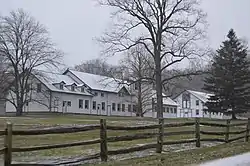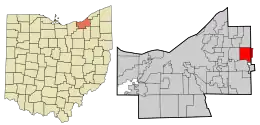Hunting Valley, Ohio
Hunting Valley is a village in Cuyahoga and Geauga counties in the U.S. state of Ohio. The population was 763 as of the 2020 census. An eastern suburb of Cleveland, it is part of the Cleveland metropolitan area. In 2000, Hunting Valley was ranked the 6th highest-income place in the United States. It was the 17th highest-income place in 2010, but still the wealthiest locale in Ohio.
Hunting Valley, Ohio | |
|---|---|
 Halfred Farms, the former estate of Windsor T. White | |
 Location in Cuyahoga County and the state of Ohio. | |
| Coordinates: 41°28′34″N 81°24′4″W | |
| Country | United States |
| State | Ohio |
| Counties | Cuyahoga, Geauga |
| Area | |
| • Total | 8.01 sq mi (20.75 km2) |
| • Land | 7.89 sq mi (20.44 km2) |
| • Water | 0.12 sq mi (0.31 km2) |
| Elevation | 764 ft (233 m) |
| Population (2020) | |
| • Total | 763 |
| • Density | 96.68/sq mi (37.33/km2) |
| Time zone | UTC-5 (Eastern (EST)) |
| • Summer (DST) | UTC-4 (EDT) |
| ZIP code | 44022, 44040 |
| Area code(s) | 440, 216 |
| FIPS code | 39-36918[3] |
| GNIS feature ID | 1041884[2] |
| Website | huntingvalley.net |
History
Hunting Valley is one of the five municipalities, along with Moreland Hills, Orange Village, Pepper Pike and Woodmere, that originally formed Orange Township, established in 1820. Orange Township was the birthplace of President James A. Garfield in 1831.
Roundwood Manor was built in 1923 by the railway barons the Van Sweringen brothers.[4] In 1924, Hunting Valley was incorporated as a village encompassing the northeast quadrant of the original Orange Township. Hunting Valley is also part of the Connecticut Western Reserve.
Hunting Valley has never joined Northeast Ohio Regional Sewer District, nor its storm water management program. It currently manages its own program in protecting the Chagrin River Watershed.
Geography
Hunting Valley is located at 41°28′34″N 81°24′04″W (41.476019, -81.401233).[5]
According to the United States Census Bureau, the village has a total area of 8.01 square miles (20.75 km2), of which 7.89 square miles (20.44 km2) is land and 0.12 square miles (0.31 km2) is water.[6] The village is almost entirely within Cuyahoga County limits, the exception being a small fraction on its easternmost edge, which is in neighboring Geauga County.
Demographics
| Census | Pop. | Note | %± |
|---|---|---|---|
| 1930 | 401 | — | |
| 1940 | 374 | −6.7% | |
| 1950 | 477 | 27.5% | |
| 1960 | 629 | 31.9% | |
| 1970 | 797 | 26.7% | |
| 1980 | 786 | −1.4% | |
| 1990 | 799 | 1.7% | |
| 2000 | 735 | −8.0% | |
| 2010 | 707 | −3.8% | |
| 2020 | 763 | 7.9% | |
| U.S. Decennial Census[7] | |||
2010 census
At the 2010 census there were 707 people, 277 households, and 216 families living in the village. The population density was 89.4 inhabitants per square mile (34.5/km2). There were 322 housing units at an average density of 40.8 per square mile (15.8/km2). The racial makeup of the village was 97.0% White, 0.6% African American, 1.1% Asian, 0.3% from other races, and 1.0% from two or more races. Hispanic or Latino of any race were 2.7%.[8]
Of the 277 households 26.7% had children under the age of 18 living with them, 72.9% were married couples living together, 2.2% had a female householder with no husband present, 2.9% had a male householder with no wife present, and 22.0% were non-families. 19.9% of households were one person and 12.3% were one person aged 65 or older. The average household size was 2.55 and the average family size was 2.90.
The median age in the village was 50.3 years. 23.1% of residents were under the age of 18; 5.8% were between the ages of 18 and 24; 11.4% were from 25 to 44; 33.5% were from 45 to 64; and 26.4% were 65 or older. The gender makeup of the village was 49.2% male and 50.8% female.
2000 census
At the 2000 census there were 735 people, 284 households, and 241 families living in the village. The population density was 92.1 inhabitants per square mile (35.6/km2). Of the 735 people, 728 of them are white. There were 317 housing units at an average density of 39.7 per square mile (15.3/km2). The racial makeup of the village was 99.05% White, 0.14% African American, 0.68% Asian, and 0.14% from two or more races. Hispanic or Latino of any race were 0.54%.[3] 17.4% were of English, 17.1% German, 11.0% Irish, 9.0% Italian, 5.7% American and 5.6% Russian ancestry according to Census 2000.
Of the 284 households 27.8% had children under the age of 18 living with them, 77.8% were married couples living together, 4.9% had a female householder with no husband present, and 15.1% were non-families. 13.7% of households were one person and 6.0% were one person aged 65 or older. The average household size was 2.59 and the average family size was 2.80.
The age distribution was 21.6% under the age of 18, 4.4% from 18 to 24, 14.4% from 25 to 44, 35.9% from 45 to 64, and 23.7% 65 or older. The median age was 51 years. For every 100 females there were 99.2 males. For every 100 females age 18 and over, there were 91.4 males.
The median household income was in excess of $200,000, as is the median family income . Males had a median income of over $100,000 versus $42,083 for females. The per capita income for the village was $144,281. About 2.1% of families and 2.3% of the population were below the poverty line, including 0.6% of those under age 18 and none of those age 65 or over.
Schools
Hunting Valley is served by the Orange City School System.
Hunting Valley is also home to the upper school campus of the college preparatory University School, and is a nearby community for other private schools.
Squire Valley View Farm, a research and recreational property belonging to Case Western Reserve University, is situated on 381 acres of land bequeathed to the school by the locally renowned Squire and Wade families in the early and mid 20th century.
References
- "ArcGIS REST Services Directory". United States Census Bureau. Retrieved September 20, 2022.
- "US Board on Geographic Names". United States Geological Survey. October 25, 2007. Retrieved January 31, 2008.
- "U.S. Census website". United States Census Bureau. Retrieved January 31, 2008.
- ROUNDWOOD MANOR IN DAISY HILL
- "US Gazetteer files: 2010, 2000, and 1990". United States Census Bureau. February 12, 2011. Retrieved April 23, 2011.
- "US Gazetteer files 2010". United States Census Bureau. Archived from the original on January 12, 2012. Retrieved January 6, 2013.
- "Census of Population and Housing". Census.gov. Retrieved June 4, 2015.
- "U.S. Census website". United States Census Bureau. Retrieved January 6, 2013.

